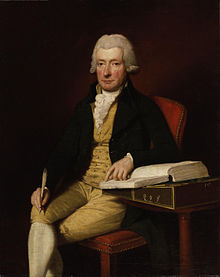This article needs additional citations for verification. (March 2020) |
William Cowper | |
|---|---|
 A 1792 portrait by Lemuel Francis Abbott[1] | |
| Born | 26 November 1731 Berkhamsted, Hertfordshire, England |
| Died | 25 April 1800 (aged 68) East Dereham, Norfolk, England |
| Education | Westminster School |
| Occupation | Poet |
William Cowper (/ˈkuːpər/ KOO-pər; 15 November 1731 (Julian)[2] / 26 November 1731 (Gregorian) – 14 April 1800 (Julian)[2] / 25 April 1800 (Gregorian)) was an English poet and Anglican hymnwriter.
One of the most popular poets of his time, Cowper changed the direction of 18th-century nature poetry by writing of everyday life and scenes of the English countryside. In many ways, he was one of the forerunners of Romantic poetry. Samuel Taylor Coleridge called him "the best modern poet", whilst William Wordsworth particularly admired his poem "Yardley-Oak".[3]
After being institutionalised for insanity, Cowper found refuge in a fervent evangelical Christianity. He continued to suffer doubt about his salvation and, after a dream in 1773, believed that he was doomed to eternal damnation. He recovered, and went on to write more religious hymns.
His religious sentiment and association with John Newton (who wrote the hymn "Amazing Grace") led to much of the poetry for which he is best remembered, and to the series of Olney Hymns. His poem "Light Shining out of Darkness" gave English the phrase: "God moves in a mysterious way/ His wonders to perform."
He also wrote a number of anti-slavery poems, and his friendship with Newton, who was an avid anti-slavery campaigner, resulted in Cowper's being asked to write in support of the Abolitionist campaign.[4] Cowper wrote a poem called "The Negro's Complaint" (1788) which rapidly became very famous, and was often quoted by Martin Luther King Jr. during the 20th-century civil rights movement.[5] He also wrote several other less well-known poems on slavery in the 1780s, many of which attacked the idea that slavery was economically viable.[6]
- ^ Abbott, Lemuel Francis (1792), Cowper (portrait)
- ^ a b Chisholm, Hugh, ed. (1911). "Calendar". Encyclopædia Britannica. Vol. 4 (11th ed.). Cambridge University Press.
- ^ Cameron. "William CowperDereham Norfolk". poetsgraves.co.uk.
- ^ "Abolitionist campaigners". bl.uk. Archived from the original on 26 June 2020. Retrieved 28 April 2015.
- ^ King, Martin Luther Jr., Carson, Clayborne; Holloran, Peter; Luker, Ralph; et al. (eds.), The Papers of Martin Luther King, Jr: Threshold of a new decade
- ^ "Great campaigners", Abolition background, UK: BL, archived from the original on 26 June 2020, retrieved 28 April 2015